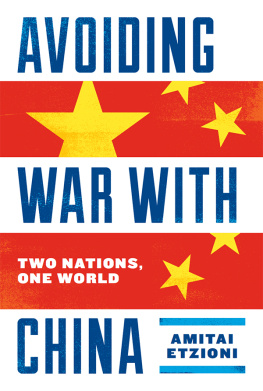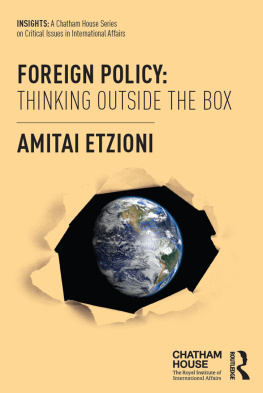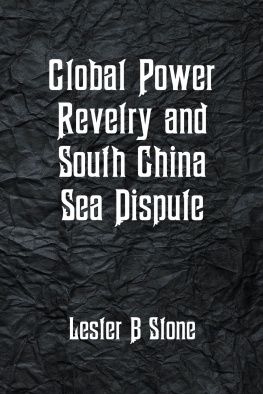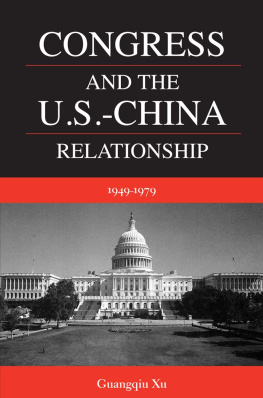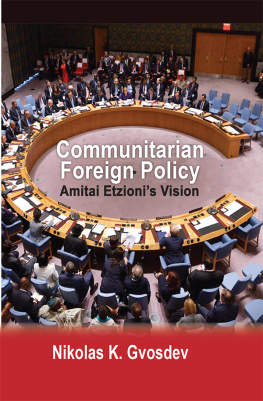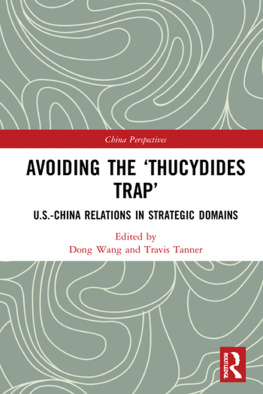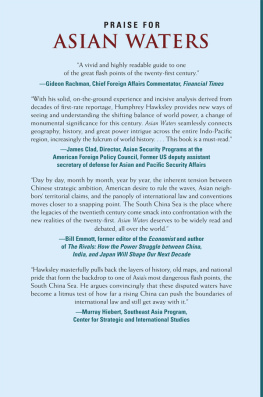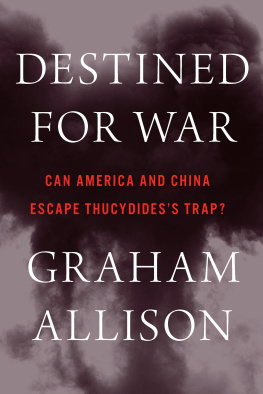OTHER BOOKS BY AMITAI ETZIONI
Foreign Policy: Thinking Outside the Box (2016)
The New Normal (2014)
Hot Spots: American Foreign Policy in a Post-Human-Rights World (2012)
From Empire to Community: A New Approach to International Relations (2004)
Security First: For a Muscular, Moral Foreign Policy (2006)
Political Unification Revisited (2001)
The New Golden Rule (1996)
The Active Society (1968)
Winning without War (1964)
The Hard Way to Peace (1962)
A Diary of a Commando Soldier (1952)
INTRODUCTION
T he change of administration following the 2016 election in the United States provides an opportunity to reexamine US foreign policy in general and regarding China in particular. We shall see shortly that there are good reasons to fear that the United States and China are on a collision course. Before we move further down this road, the publicand not just policymakersshould closely study whether such a confrontation is avoidable, without either side sacrificing its core values or interests. This book is meant to provide a dialogue starter for such a much-needed public discourse.
If you are the betting type, I have a promising bet for you. Wager that the United States and China will engage in a major war in the foreseeable future. Some scholars who specialize in international relations, such as John Mearsheimer, contend that a war between the United States and China is more likely today than a hot war between the United States and the USSR ever was.
Others consider a war with China inevitable because of an iron law of history, according to which prevailing superpowers such as the United States necessarily fail to yield power quickly enough to a new power such as China, thereby causing rising tensions and, eventually, war. Graham Allison writes: The defining question about global order for this generation is whether China and the United States can escape Thucydidess trap. The Greek historians metaphor reminds us of the attendant dangers when a rising power rivals a ruling power. [Avoiding war] required huge, painful adjustments in attitudes and actions on the part not just of the challenger but also the challenged. (In one of these cases, Great Britain yielded to the United States during the late 1800s and early 1900s.)
This book hopes to sour your bet (with due apologies) by outlining several policies that may allow us to achieve a peaceful transition of power without endangering the United States core interests in Southeast Asiaor undermining the United States position as a global power. To find a peaceful way, both the United States and China need to change their foreign policies. Scores of books and articles argue what China must do: stop its military buildup, improve its transparency, bring its military more under the control of the government rather than the Communist Party, and transition to a liberal democracy, among other recommendations. This book, in contrast, is written by an American for Americans; it focuses on the actions the United States could take to reduce the probability that the world will face another major war.
I cannot stress enough that when I point in the following pages to flaws in the ways that the United States is currently dealing with China (for instance, by excluding it from the Trans-Pacific Partnership), this does not mean that China has conducted itself better or does not need to mends its ways. It simply means that Chinas warts have been amply charted and dissected; this book focuses on what the United States could do better.
To proceed, Americans need to engage in a national dialogue, a public debate about what the United States China policy is and should be. The United States often engages in such debates about other subjects, such as same-sex marriage, climate change, dealing with ISIS and with Iran. Such a national debate about China policy has not yet happened.
Indeed, during the most recent presidential primary season, both Republican and Democratic presidential candidates have mainly avoided the subject, though Donald Trump argued that China is out to eat our lunch. Now that the elections are over, and a new administration is coming in, this is a particularly opportune time to engage in such a public debate. This book seeks to serve this overdue give-and-take.
Going to or sliding into war with a rising China is especially tragic becauseas I see itChina and the United States share many complementary interests and have surprisingly few substantive reasons to come to blows.symbolic or hyped-up ones, such as the question of who owns a pile of rocks somewhere difficult to find on a map.)
Some use the terms panda huggers and dragon slayers to categorize analysts and public leaders in the West according to the approaches they recommend adopting toward China; these terms replace the doves and hawks of the Cold War. (I sometimes refer to them as Engagers and Adversarians.)
Some might consider this book to fall on the dovish side. However, I am not a panda hugger, but rather someone who has been to war. This experience left me with a strong commitment to seeking peaceful resolutions to international conflicts.
The overdue public debate about Americas China policy will not take place in a vacuum. The US military, in the course of carrying out its duty to secure the United States, has identified China as a major strategic threat. Accordingly, it has made the case in the media, in congressional hearings, and in presentations to the White House that the United States should take a tougher approach to China and should build up its military in order to prepare for a war with China. The defense industry supports the same charge for its own reasons. To digress, I do not claim that there exists a military-industrial complex in the sense of a solid military-corporate bloc whose representatives meet at night in a motel in Arlington to plot how to gain glory and profit by pushing the United States into war with China. As a matter of fact, the US militarys various services compete with each other; thus the US Army is much less inclined to target China than the US Air Force and Navy are. And many corporations that make money out of peaceful pursuits compete with defense-focused ones, and defense corporations compete with each other. However, as we shall see, major segments of the military and corporations do have strong, vested interests in preparing for war with China for reasons that do serve their constituents, but not necessarily the good of the United States (chapter 1).
The White House and Congress have neither systematically examined these pressures to prepare for war with China, nor squared them with other assessments of Chinas threat, especially those of the Department of State and the intelligence community. It is up to leading civilian authoritiesthe president of the United States and members of Congressto make the ultimate decisions in these matters.
So far, the president and Congress have muddled through, which has allowed the United States and China to drift closer to war. To provide but one small example, on December 16, 2015, the

